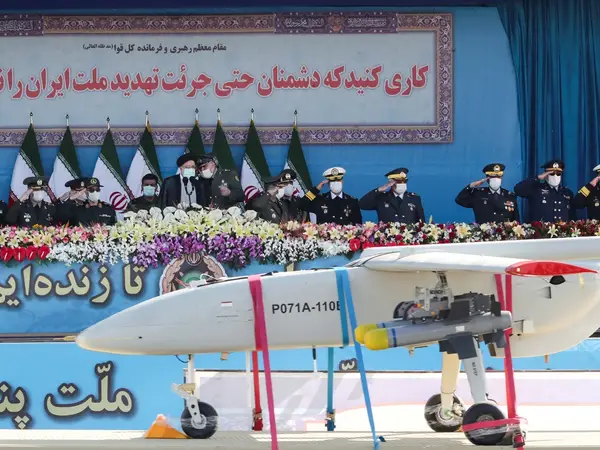Amid Houthi attacks in the Red Sea, the US announced new sanctions Tuesday, targeting ten entities and four individuals for their role in advancing Iran’s drone program.
Through a complex network of intermediary and front companies, those sanctioned would purchase drone components from the US (or other foreign countries) and deliver to the IRGC for its Unmanned Aerial Vehicle (UAV) program.
"We remain focused on disrupting the efforts of Iran and its agents to circumvent US sanctions in support of Iran's weapons programs, including its drone program, which have been used to support and supply terrorist organizations and other foreign adversaries –such as Russia– around the globe,” the United States Attorney Matthew Graves said in a statement.
In recent years, drones have become a major element of Iran’s military and strategic approach, put to use mainly by the regime’s allies and proxies.
Iran-made drones have been used widely –and fatally–by Russia in Ukraine. Russia has fired hundreds of Iranian kamikaze drones at Ukraine's civilian targets. Militant groups in Syria and Iraq have deployed them against US bases. And Yemen Houthis are using them to attack commercial vessels in the Red Sea.
Since the beginning of the Israeli onslaught on Gaza, Iran has published videos that it claims show its drones “looking over” US warships in the region, boasting about its capabilities.
"Iran is taking advantage of what is a very very difficult situation right now. It's not surprising," US Senator Michael Bennet told Iran International's Arash Aalaei on the Iran-backed Houthi attacks in the Red Sea, warning that there will be "serious" economic consequences "if the shipping lanes are shut down".
Existing sanctions prohibit export of dual-use or sensitive technology to Iran. And that is exactly what the sanctioned individuals are accused of doing.
Hossein Hatefi Ardakani and Gary Lam (also known as Lin Jinghe) are accused of conspiring to illegally purchase and export US-made dual-use microelectronics to Iran.
"Ardakani and his co-conspirators crafted a sophisticated web of front companies to obscure the illicit acquisition of US and foreign technology to procure components for deadly UAVs," special agent Michael Krol said. "These very components have been found in use by Iran's allies in current conflicts, including in Ukraine."
The targeted individuals and entities are based in Iran, Malaysia, Hong Kong and Indonesia, according to the US Treasury Department. They would use foreign companies to evade US controls, and in this way, managed to procure “hundreds of thousands of dollars” worth of drone components for the IRGC.
"Iran's illicit production and proliferation of its deadly UAVs… continues to exacerbate tensions and prolong conflicts, undermining stability,” Undersecretary for Terrorism and Financial Intelligence Brian Nelson said in a statement.
Some Republican lawmakers have blamed President Biden for the current crisis in the Middle East, saying that he has chosen to look away when it comes to enforcing sanctions on Iran –in effect, rewarding the regime with tens of billions of dollars more in oil revenue that helps fund a range of malign activities in the region.
“We must continue to respond to any attempt by Iran to avoid sanctions,” Congressman Colin Allread said Tuesday, “that's why I lead a bipartisan effort urging the Treasury to expand its work to prevent Iran from using illicit and deceptive shipping practices to evade US sanctions on oil exports.”
